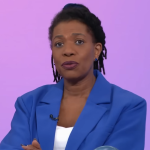The movie trailer begins with an outline of the iconic glasses worn by Mohandas Gandhi, the leader who helped India win independence from the British colonialists in 1947. In the backdrop of a devotional song that Gandhi loved, the outline slowly morphs into what appears like his face.
Then, a raucous beat drops, followed by a rap song. A face is finally revealed: not Gandhi, but an actor who plays the independence leader’s ideological nemesis, Vinayak Damodar Savarkar — the man considered the fountainhead of Hindu nationalism in India.
It is the same ideology Prime Minister Narendra Modi has harnessed to cement his power as his ruling party makes strides in its quest to turn the secular country into a Hindu nation.
The glorified biopic on the early 20th-century Hindu nationalist ideologue — called “Swatantra Veer Savarkar,” or “Independent Warrior Savarkar” — hits Indian theatres Friday, just weeks ahead of a national vote that is set to determine the political direction of the country for the next five years. The movie coincides with a cluster of upcoming Bollywood releases based on polarizing issues, which either promote Modi and his government’s political agenda, or lambast his critics.
Analysts say the use of popular cinema as a campaign tool to promote Hindu nationalism feeds into a divisive narrative that risks exacerbating the already widespread political and religious rifts in the country.
Raja Sen, a film critic and Bollywood screenwriter, said movies used to represent a mix of nationalistic cinema and films promoting national integration.
“That appears to be fast changing,” Sen said. “The scary part is that these films are being accepted now. It is truly frightening.”
For more than a century, Bollywood has unified India, a country riven with religious, caste and political divide. It’s been a rare industry where religion has been least influential in deciding the success of filmmakers and actors. Bollywood films have also championed political diversity and religious harmony.
That culture, however, appears to be under threat.
Under Modi’s Hindu nationalist government, many filmmakers have made movies on bygone Hindu kings extolling their bravery. Boisterous and action-packed movies valorizing the Indian Army have become box office successes. Political dramas and biopics that eulogize Hindu nationalists are the norm.
In most of these films, the stock villains are medieval Muslim rulers, leftist or opposition leaders, free thinkers or rights activists — and neighboring Pakistan, India’s arch rival.
The biopic on Sarvarkar, who advocated for India’s future as a Hindu nation, is emblematic of this broader trend.
Two more upcoming films claim to reveal a conspiracy about a 2002 train fire in western Gujarat state that ignited one of the worst anti-Muslim riots in India. More than 1,000 people, mostly Muslims, were killed in riots. It was a hugely controversial episode in Modi’s political career, as he was the chief minister of Gujarat at the time.
Another film claims to expose the “anti-national agenda” of a university in the capital, New Delhi. The film is loosely based on Jawaharlal Nehru University, one of the country’s premier liberal institutions that has become a target of Hindu nationalists and leaders from Modi’s Bharatiya Janata Party.
Many past films with similar themes became box office successes. Modi’s party often publicly endorsed them despite criticism of his government for stifling dissent.
In February, Modi himself praised “Article 370,” a film that celebrated his government’s controversial decision to strip Indian-controlled Kashmir of its special status and statehood in 2019. Some film reviewers called the movie “factually incorrect” and a “thinly veiled propaganda film” favoring the government.
“The Kerala Story,” the ninth-highest grossing Hindi film of 2023, was widely panned for inaccuracies in depicting Christian and Hindu girls from India’s southern Kerala state who were lured to join the Islamic State. The film was banned in two states ruled by opposition parties, who said it was Islamophobic and would destroy religious harmony.
At the same time, at least three states ruled by Modi’s party made tickets to see the film tax-free and held mass screenings. Modi himself endorsed viewing the film during a state election rally.
Sudipto Sen, the film’s director, said the movie exposed the “nexus between religious fundamentalism and terrorism” through a human story, and did not vilify Muslims.
“You can’t ignore the emotional appeal of these films. In fact, every state government should endorse them,” Sen said.
Another of Sen’s films, based on Maoist insurgency in central Indian jungles, was released March 15. Its primary villains, apart from the insurgents, were rights activists and left-leaning intellectuals. One critic called it “two hours of diatribe against communism.”
While such films have been applauded by India’s right, other Bollywood movies have fallen into the crosshairs of Hindu nationalists.
Right-wing groups have frequently threatened to block the release of films they deem offensive to Hinduism. Hindu activists often make calls on social media to boycott such films.
Some filmmakers caught up in India’s increasingly restrictive political environment say they’re resorting to self-censorship.
“People like me feel disempowered,” said Onir, a National Award-winning filmmaker who goes by just one name.
Onir has made widely acclaimed films highlighting LGBTQ+ rights. In 2022, Onir wanted to make a movie inspired by a former Indian army major who falls in love with a local man in disputed Kashmir, where armed rebels seeking independence or a merger with Pakistan have fought Indian rule for decades. The film’s script was rejected by India’s defense ministry because it was “distorting the image of Indian army,” the filmmaker said.
“Look at the films that are getting released now. Any film that goes against the government’s narrative is called anti-national. There is no fair ground. In fact, there is an atmosphere of fear,” Onir said.
Polarizing films — which Onir noted constitute most of the recent releases, while movies focusing on discrimination against minorities face hurdles — tend to make big money, signaling the appetite for such content.
Some say the rise in divisive films reflects opportunism among filmmakers.
“The idea that this is the way to success has permeated into Bollywood,” said Raja Sen, the critic and screenwriter.
He said such films make good business sense because of the noise they generate, even though they serve as the cinematic equivalent of “WhatsApp forwards” — a reference to misinformation and propaganda spread on the social messaging platform.
“Indian films need an artistic rebellion. I hope we can start seeing that,” Sen said.











